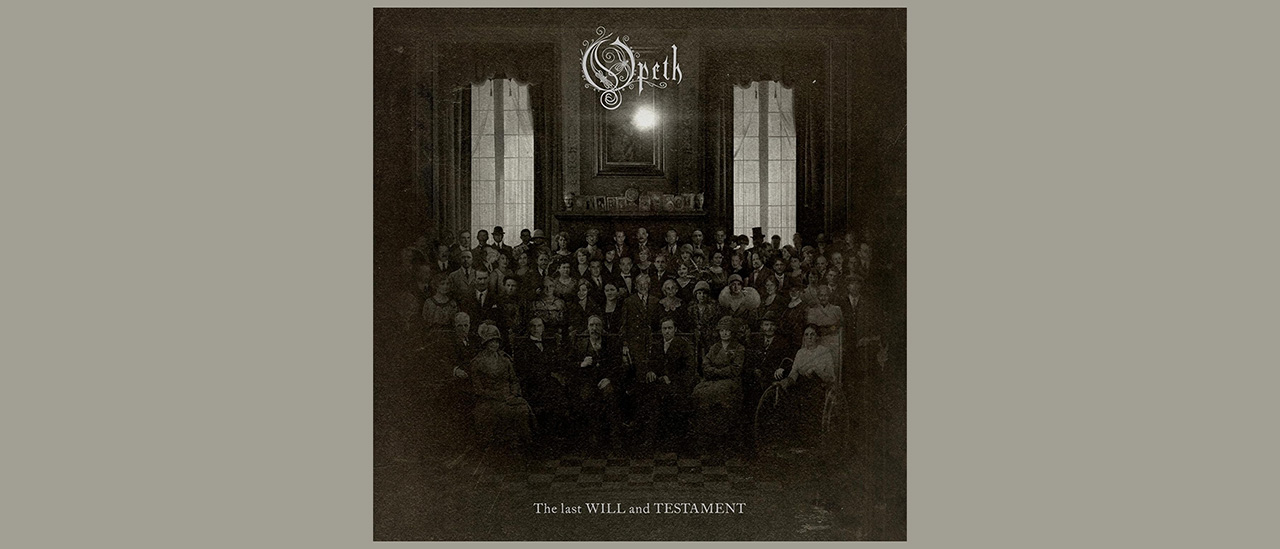It’s been a long wait for new Opeth music. In the five-year interim between releases, the band have switched record labels, leaving Nuclear Blast for Reigning Phoenix Music, and there’s a fresh face on the drums as Waltteri Väyrynen replaces Martin Axenrot.
Yet despite the newness of these changes, musically, The Last Will And Testament feels somehow very old-school for the Swedes. Mikael Åkerfeldt and his bandmates have crafted a full-blown, unabashed concept album – a format they haven’t explored since Still Life way back in 1999.
Twenty-five years on, Opeth’s sound has evolved by leaps and bounds, but Åkerfeldt’s ability to build an album rich in atmosphere, characters and drama remains as impressive as it’s ever been.
The story is set in the 1920s and concerns a fractious family brought together for the reading of a will after the death of the clan’s patriarch; but the gathering reveals dark secrets long kept hidden. Unusually, seven of the eight tracks don’t have conventional titles – instead they’re simply numbered and marked with the paragraph symbol ‘§’. It’s only the closing song, A Story Never Told, that has what might be considered a traditional title.
The album is led primarily by the guitars of Åkerfeldt and Fredrik Åkesson, rather than the keyboards and organ of Joakim Svalberg, who featured prominently on releases from the last decade such as Sorceress and Pale Communion. That’s not to suggest a return to the acerbic, abrasive sound of their early years, however. The guitar tone is earthy and crunchy, rather than brutal, but at the same time this record feels darker than its immediate predecessors.
There’s weight and density to the arrangements and a knotty quality to the riffs as the guitars and drums are locked tightly together, playing complicated patterns. It’s never as ostentatiously virtuosic as the approach of younger prog bands like Arch Echo, but it certainly feels like an evolutionary step for Opeth.
The natural gravitas to Ian Anderson’s voice works a treat to communicate the drama of the unfolding narrative
The one musical ingredient that might suggest a throwback to the past is the return of Åkerfeldt’s growled vocals – but they appear here in a very different context, used to articulate key moments in the narrative, rather than being a default vocal technique as they were in the group’s old death metal days.
Even though the singer hasn’t used such delivery in the studio since 2008’s Watershed, his growls sound suitably deep and menacing, suggesting he hasn’t lost any power with the passing of the years. And there’s much more than menace to his performance as he reaches almost a falsetto range in §4 and brings a delicate touch to the quiet moments of §3.
The album is produced by Åkerfeldt and Stefan Boman, who worked on In Cauda Venenum; while Dave Stewart of Hatfield And The North and National Health handles the string arrangements. The latter serves to expand Opeth’s palette; setting the mood in §1, applying another layer of colour to the melody in §3, and launching into unexpected directions in §4: it’s the strings that lead the track into a Middle Eastern vibe.
Compared to their post-Heritage output, The Last Will And Testament may not be Opeth’s most immediately accessible work
Stewart isn’t the only British prog veteran to contribute to the album. Ian Anderson provides spoken dialogue for some of the key story beats, and the occasional flute solo. The natural gravitas to his voice works a treat to communicate the drama of the unfolding narrative.
The other guest is Europe’s Joey Tempest, who lends his dulcet tones to §2, providing a counterpoint to Anderson’s proclamations – and apparently reaching notes that were outside Åkerfeldt’s comfort zone. However, Tempest is surprisingly far back in the mix, and it’s easy to miss his contribution on the first pass.
The musicianship is consistently impressive, though: the lead guitar work in §6 is distinctly tasteful, with a bluesy inflection that would make it right at home on many a vintage prog album. Svalberg punctuates §7 with brief but appealing keyboard features. Recording the album at the fabled Rockfield Studios lends the record a warmth that reinforces that old school vibe.
Similarly, the acoustic passages of §2 and §4 articulate the influence of Jethro Tull and early Genesis, while A Story Never Told has a touch of symphonic rock in the lush string section.
Compared to their post-Heritage output, The Last Will And Testament may not be Opeth’s most immediately accessible work. The complexity of the shifting rhythms and riffs, the multiple narrative and performative voices, and the whole family drama concept make for the sort of material that demands time to be properly digested and absorbed. But it promises to be time well spent.
The Last Will And Testament is out now via Reigning Phoenix Music.




